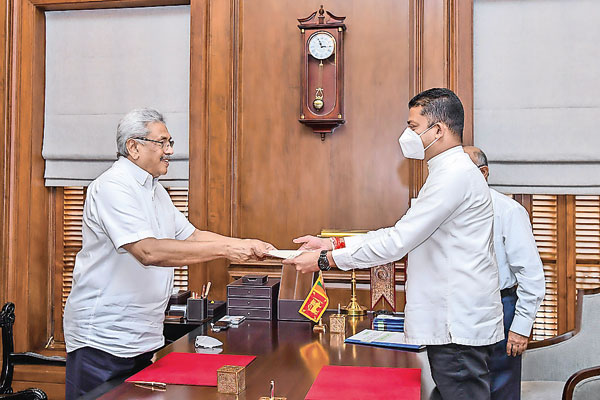News
28,000 community police officers to keep neighbourhood watch

Mr. Amunugama was appointed State Minister for Community Police Services
A Community Police contingent of 28,000 is to work out of Grama Niladari offices rather than Police stations to resolve minor neighbourhood disputes and counsel wayward youth before issues escalate into bigger proportions, according to the Government’s newest plan to nip local-level problems in the bud.
These community police officers will come under a new State Minister, Dilum Amunugama, who took his oaths before President Gotabaya Rajapaksa this week. The state ministry will come under the cabinet Ministry of Public Security.
Mr. Amunugama, who is also State Minister for Vehicle Regulation, Bus Transport Services, Train Compartments and the Motor Car Industry, told the Sunday Times that the men and women of the Community Police Service would be stationed in their own residential areas, play the role of the former Village Headman (Gam Muladani) and even act as Intelligence officers for the State.
“As per the President’s directions, we plan to recruit 28,000 new officers to the police to serve in the Community Police Service. We will assign two officers to each Grama Niladhari (GN) Division. The difference here is that the officers will be assigned to areas where they reside,” he explained.
The officers will be based out of offices where the area Grama Niladhari and other local officials work from. They will continue to work in these areas through their first promotion to the rank of Sergeant. However, those who rise to the rank of Sub Inspectors (SI) will thereafter be assigned to other duty stations.
The primary aim of recruiting the new officers is to establish a strong community police service to ensure that complaints related to most minor disputes are resolved at the community police level without complainants going to police stations, State Minister Amunugama noted.
Issues such as minor domestic disputes and scuffles over boundary fences for example, could be taken to the local community police officers without having to go and lodge complaints with the area police station, he said. “So many minor complaints are made at police stations and the case files get piled up in courts. Therefore, in such minor disputes, the officers will try to reach a settlement with the parties first, and only if that fails, will there be a complaint made to the station and the matter taken to court.”
As the officers will be from the local community, they will have a clear understanding of the issues their community faces, the State Minister pointed out. “They will work closely with the local civil defence committees and the communities themselves. I would say their role is closer to a ‘Gam Muladeni’ (Village Headman),” he elaborated.
“For example, COVID-19 is a major threat right now; so the officers will have to work with other local authorities to ensure that COVID health guidelines are being followed in their communities. Drugs are also a big problem and community policer officers will be working with the area civil defence committees to prevent the spread of drugs in their areas. The officers will also be useful to the police as a source of genuine intelligence as they would be providing accurate reports on the goings on in their areas.”
 While the new recruits will have the same powers as normal police officers, a major part of community policing is working with the local community, State Minister Amunugama noted. That means the first response of the officers should not be to arrest anyone who they find to have committed an offence. “If the officer knows that a youth is smoking ganja, he should counsel the person and advise him to stop and assist the youth to seek help if he requires.”
While the new recruits will have the same powers as normal police officers, a major part of community policing is working with the local community, State Minister Amunugama noted. That means the first response of the officers should not be to arrest anyone who they find to have committed an offence. “If the officer knows that a youth is smoking ganja, he should counsel the person and advise him to stop and assist the youth to seek help if he requires.”
As such, the State Minister said they would be looking into candidates who have functioned in leadership roles in places such as community organisations, Dhamma Schools and others when recruiting new officers for the community police.
The cabinet paper related to the recruiting of the new officers is being drafted, said Mr Amunugama, adding that he is confident that the recruitment process will begin soon after cabinet approval is granted.


